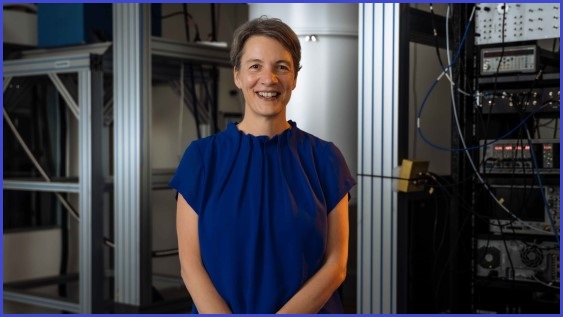Australia’s fast-growing quantum computing industry has been recognised as quantum pioneer Professor Michelle Simmons won a Prime Minister’s 2023 Prize for Science, lauding both the research of science and its teaching.
Professor Simmons, whose early research in quantum computing led her to found Silicon Quantum Computing (SQC) and head the UNSW Sydney team responsible for a range of world-leading innovations, has been credited with world-leading breakthroughs in the race to design and manufacture commercial-scale quantum computers.
The goal of her team at the Centre of Excellence for Quantum Computing and Communication Technology is “to build the world’s first error-corrected quantum computer, but to build it here in Australia,” Simmons said as she was awarded the 2023 Prime Minister’s Prize for Science, which includes $250,000.
Quantum computing scientists in Australia and elsewhere have been working for years to find a way to better control the behaviour of ‘qubits’ on which quantum computers rely, and SQC “is the only company in the world that can manufacture with atomic precision,” Simmons said, “so our talent to make a whole quantum computer is already here.”
That talent could make SQC a major player in an industry that CSIRO has called a $6 billion opportunity for Australia, where a formal Quantum Strategy has galvanised efforts to bootstrap the local industry and paved the way for government and industry to develop an industry that could create 16,000 new jobs.
“Every industry that relies on data will be impacted by quantum computing,” Simmons said, noting that “when we created the company, we actually had the government, university and industry all coming together to help form the company.”
Winning the Science Prize, an “over the moon” Simmons added, “is real recognition of a quarter of a century’s worth of dedicated work to try and build something quite unique – to try and control the atomic world.”
Recognising Australian innovation and teaching
Simmons was one of seven Australian innovators recognised during the awards.
Griffith University Associate Professor Lara Herrero, for one, received the 2023 Prime Minister’s Prize for New Innovators for her work in analysing Ross River virus (RRV) and repurposing a known drug into a world-first treatment to help millions of global suffers of viral arthritis.
Professor Glenn King – who pioneered the use of Australian funnel-web spider venom as the basis for eco-friendly insecticides through his company Vestaron and will next year start clinical trials for heart-related treatments in his role as Chief Scientific Officer with Infensa Bioscience – was recognised with the 2023 Prime Minister’s Prize for Innovation.
Life Scientist of the Year Professor Chris Greening – who through his work at Monash University discovered that airborne, waterborne and soil-borne microbes help regulate climate change and air pollution – received the 2023 Frank Fenner Prize while ANU Professor Yuerui (Larry) Lu was named Physical Scientist of the Year for his discovery of interlayer exciton pairs and creation of the world’s thinnest microlens.
Recognising that science innovators often develop their love at an early age, the awards also recognised exemplary science teaching.
Kalkie State School’s Judith Stutchbury received the 2023 Prime Minister’s Prize for Excellence in Science Teaching in Primary Schools due to her work teaching students about the importance of marine conservation – with a book and screenplay teaching students about the significant turtle ecosystem just 8km from their school.
Donna Buckley, a science teacher at the John Curtin College of the Arts, was awarded the 2023 Prime Minister’s Prize for Excellence in Science Teaching in Secondary Schools for her work in teaching students to apply mathematics to real-world problems, developing an accredited cyber security course for students, and championing initiatives such as the Maths Talent Quest.
“The achievements of the 2023 recipients reflect the world-class quality of Australia’s science and research sector and the dedication of our STEM teachers,” Prime Minister Anthony Albanese said as the recipients were announced.
“It confirms the future of Australian science is stronger than ever.”










